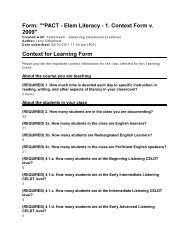The Tutoring Book - California State University, Sacramento
The Tutoring Book - California State University, Sacramento
The Tutoring Book - California State University, Sacramento
Create successful ePaper yourself
Turn your PDF publications into a flip-book with our unique Google optimized e-Paper software.
thinking about it and without realizing that their paper has something written that is completely different<br />
than what they think it says.<br />
Every tutee is different and with each one I have to change my expectations as to what a<br />
successful session will look like. Lisa really needed to find the skills to be able to do most of the writing<br />
process by herself without any help and she was much happier as we went through her paper and I gave<br />
her many ideas as to how she could edit and revise and work on her organization. I really felt like a<br />
success and that I had made a difference that day when she turned and said to me, “I really want to thank<br />
you for working with me and not talking down to me at all. Usually when I tell people I have a disability<br />
they talk to me as if I’m an idiot or like I don’t understand English, so I really just wanted to thank you<br />
for helping me.” I was shocked that people treat people with disabilities that way, but I was so ecstatic at<br />
the same time for making a difference in her life. She always randomly talks to me about how she feels<br />
like a failure and that things are too difficult for her sometimes after all the chemotherapy. I really am<br />
empathetic to how she’s feeling and I am just so glad that she now has better tools to help her with her<br />
writing process.<br />
Student 3:<br />
Another experience I had with a tutee that has dyslexia is with a girl named Shannon. Like the<br />
other students described above, Shannon chose to tell me about her disability at the beginning of the<br />
session. She is incredibly determined and an amazing writer; however, her disability hinders her ability to<br />
organize her paper and understand exactly what certain teachers are asking of her when she reads the<br />
prompt. <strong>The</strong> best way to handle a situation like this, from my experience, is to slowly reread the prompt<br />
multiple times. <strong>The</strong> first time I read it and then I have her read it back to me and then we both take notes<br />
as to what we think the prompt is asking. After doing this, we compare what we wrote and break down<br />
the prompt so that I can make sure she completely understands the purpose for the essay and how to<br />
develop a thesis for it.<br />
Ideally, student writers will share any specific disabilities that hinder their reading and writing<br />
skills. Some students, however, may not offer this information as readily as Brittany, Lisa and Shannon<br />
did. When working with any student, it is important to take note of recurring errors in his or her writing.<br />
In so doing, you may notice that some of the difficulties that your student is having could be related to<br />
dyslexia. It is best not to jump to any conclusions and ask the student immediately. We advise giving the<br />
student some time to get comfortable with you as his or her tutor. Once the student is comfortable, he or<br />
she may naturally open up and tell you about his or her disability. In the meantime, while you wait to see<br />
if the student is going to share this personal information, adjust your tutoring style as if you already know<br />
this student is dyslexic. <strong>The</strong> label is not important; helping the student succeed is what matters more than<br />
the label.<br />
<strong>The</strong> key to working with anyone who has a disability is to be patient. This is a lot to ask for some<br />
people because not all of us are capable of being as patient as we would like to be after half an hour of<br />
trying to explain to someone what a prompt is attempting to get you to write about, but what helps me is<br />
to take a deep breath and continue to try different approaches to explaining what the professor wants. As<br />
tutors we cannot be expected to make miracles happen and due to this you cannot expect to achieve great<br />
amounts of progress during every session. So if the only thing you are able to accomplish in a session<br />
with a dyslexic tutee is to explain what they need to write about, you need to realize that it is a great<br />
accomplishment because you have just done them the biggest favor they could ask for. So I am asking<br />
you to show some patience with your tutees whether they have a disability or not.<br />
**All names have been changed to protect the privacy of the student writers.**<br />
61

















